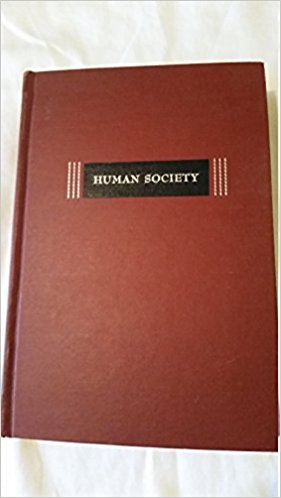Background
Kingsley Davis was born on August 20, 1908, in Tuxedo, Texas, United States. He was a son of Joseph Dyer and Winifred (Kingsley) Davis.







(This book address questions which fall into two classes: ...)
This book address questions which fall into two classes: "first, those that ask about the universal characteristics of all human society, and second those that ask about the variations from one society to another. Among the most crucial questions in the first class are the following: How does human society differ from non-human society? What enables human social systems to operate as going concerns? What for example, do they require for their existence, and what major structures do they evolve which enable them to meet these requirements? - from the Preface.
http://www.amazon.com/gp/product/0023278404/?tag=2022091-20
1949
demographer historian sociologist statistician
Kingsley Davis was born on August 20, 1908, in Tuxedo, Texas, United States. He was a son of Joseph Dyer and Winifred (Kingsley) Davis.
Davis received his degreee of a Doctor of Philosophy from Harvard University and also attended Smith College, Clark University, Pennsylvania State University, Princeton University, Columbia University, the University of California at Berkeley and the University of Southern California.
Davis began his teaching career at Smith College in Massachusetts in 1934, and held positions at many colleges until beginning a twenty-two-year stint at the University of California at Berkeley from 1955 to 1977. During this time Davis also worked with many groups, including the Population Reference Bureau and the U.S. Bureau of the Census. From 1977 to 1992, Davis taught at the University of Southern California.
Davis wrote several books detailing his theory that the world’s population increases and decreases drastically in phases based on fluctuations in the birth and death rates in developing societies. His prediction in 1957 was that by the year 2000, the world’s population would reach six billion. Studies in the mid-1990s show that his prediction may come true a couple of years early. Davis’ works include Youth in the Depression, Human Society, and a two-volume work titled World Urbanization: 1950-1970.
Davis was identified by the American Philosophical Society as one of the most outstanding social scientists of the twentieth century, and was a Hoover Institution senior research fellow. He served as president of the Population Association of America and the American Sociological Association and represented the United States on the United Nations Population Commission. He was the first sociologist in the United States to be elected to the National Academy of Sciences (1966).
Davis led and conducted major studies of societies in Europe, South America, Africa and Asia, coined the term "population explosion,", and played a major role in the naming and development of the demographic transition model.
Kingsley was also one of the original scholars in the development of the theory of overurbanization. He is also credited with coining the term "zero population growth".
Davis also published an influential article with Wilbert E. Moore entitled "Some Principles of Stratification," which was a very influential functionalist account of the reasons for social inequality. Davis and Moore synthesize Durkheim and Parsons to argue for the "functional necessity" of some positions over others: those that are highest paid go to the most deserving individuals. At the same time, the differential rewards motivates individuals to work to fill positions they might otherwise not.
(This book address questions which fall into two classes: ...)
1949
He was a fellow American Association for the Advancement of Science (chairman of the section 1963, 81, vice president 1963), American Sociological Association (president 1959 Distinguished Career award), American Statistical Association (liaison member of council 1968-1969). Member Population Association American (president 1962-1963), Sociological Research Association (president 1960), American Association of University Professors (member of council 1962-1965), American Eugenics Society (board directors 1953-1955), International Union Science Study Population (chairman American committee 1967-1968), National Academy Sciences, American Academy Arts and Sciences, American Philosophical Society, World Academy Art and Science, Phi Beta Kappa (visiting scholar 1976-1977).
He was also an oldright fellow in 1931-1932, Henry Bromfield Rogers Memorial fellow, 1932-1933, Social Science Research Council postdoctoral fellow, 1940-1941, Carnegie Corporation traveling fellow, 1952, Center Advanced Study Behavioral Sciences fellow, 1956-1957, 1980-1981, National Science Foundation senior postdoctoral fellow, 1964-1965.
Davis married Jane Quinn on August 20 in 1936, whom he divorced. They had children: Jo Ann Daily, Jefferson K. Then he married Judith Blake on November 3, 1954, whom he divorced in 1977. They had 1 daughter, Laura Isabelle. At last he married Marta H. Seoane in 1985. They had 1 child Austin Alexander Seoane.
